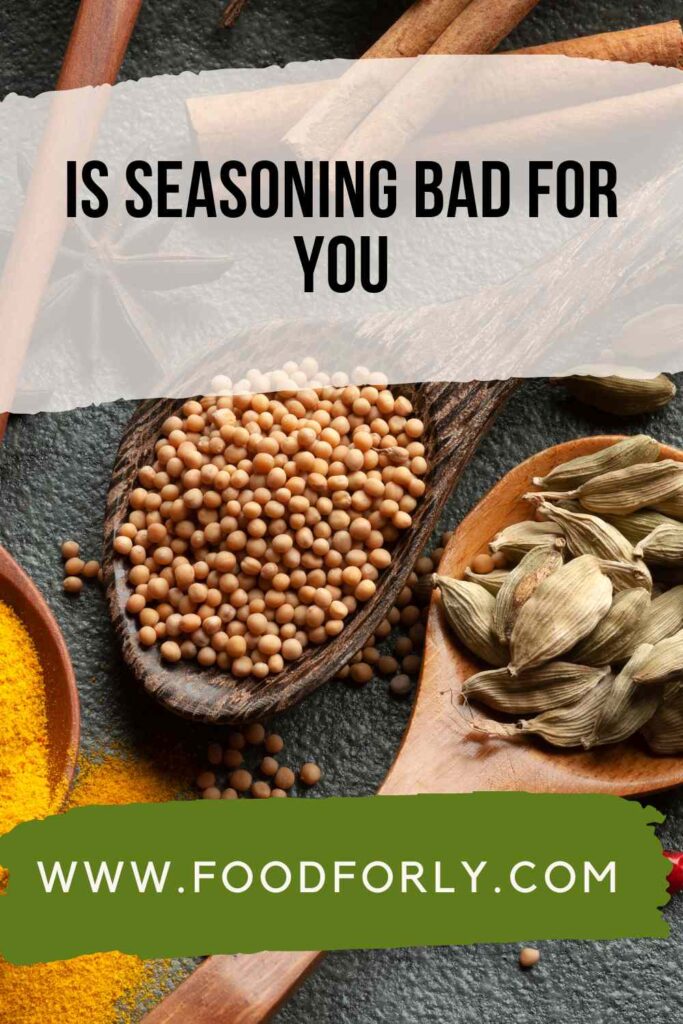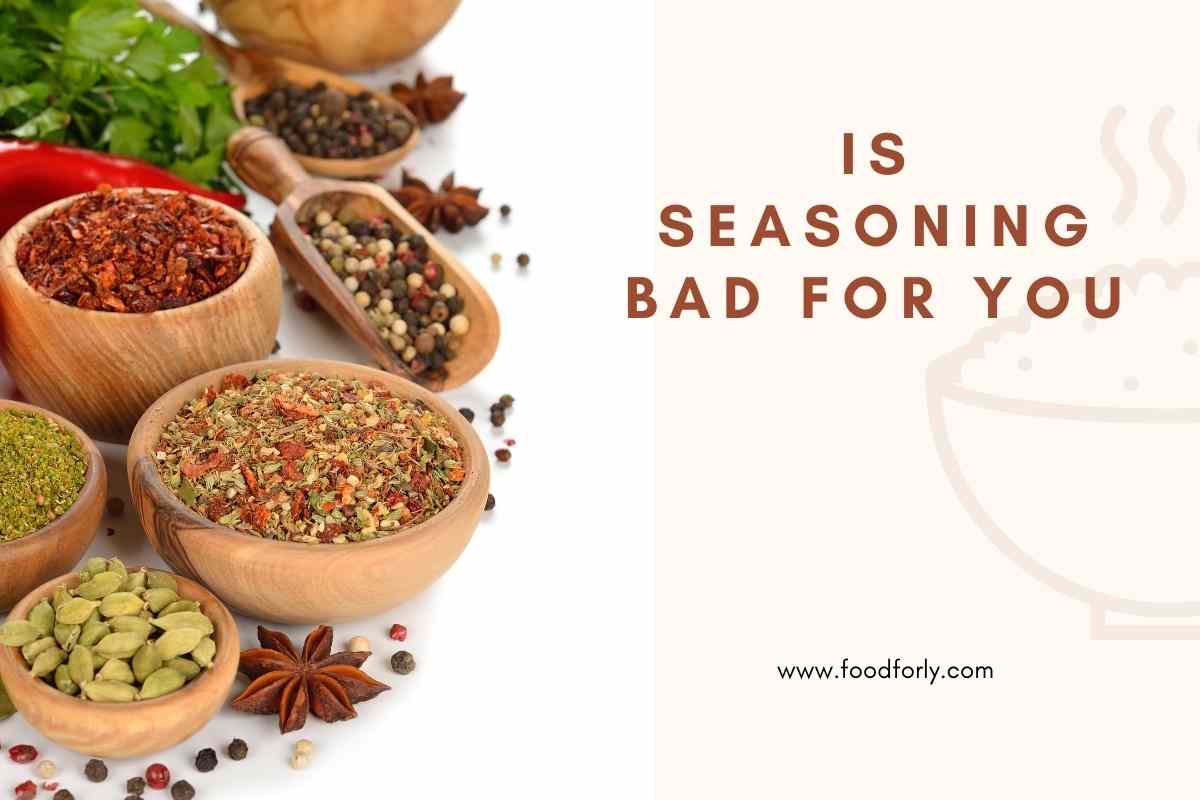Is Seasoning Bad For You
When it comes to seasoning, there is a lot of confusion about whether or not it is bad for you. On one hand, seasoning can be beneficial to health if it is consumed in moderation and is of good quality. On the other hand, too much seasoning can lead to an imbalance in nutrition, which can be bad for one’s health.
Is Seasoning Bad For You
So, is seasoning bad for you The answer is not a simple yes or no. While seasoning can be beneficial when consumed in moderation, it can also be bad for you if it is consumed in excess. Therefore, it is important to understand the different types of seasonings, how much of it is okay to consume, and how to choose the best quality seasonings to ensure the best flavour and nutrition.

Seasoning can be beneficial to health if it is consumed in moderation and is of good quality. Too much seasoning can lead to an imbalance in nutrition, which can be bad for one’s health. It is best to consume a variety of spices to get the most benefit and choose high-quality seasonings to ensure the best flavour and nutrition.
Is Seasoning Bad For You
No, seasoning is not bad for you; in fact, it can be beneficial if consumed in moderation! Spices provide important nutrition, including antioxidants that can help reduce inflammation and improve overall health. When selecting seasonings, it’s important to choose high-quality products that contain natural ingredients.
Too much seasoning can lead to an imbalance in nutrition, so it’s important to monitor your intake. For the most benefit, try to consume a variety of different seasonings and spices. Moderation is key for achieving a healthy diet that includes seasoning.
Related Post: Spices Go Bad
What Is Seasoning And What Is It Used For
Seasoning is the process of adding flavour to food. It is a common practice in cooking to add herbs and spices to dishes to enhance the flavour. Seasoning can also be used to preserve food. Salt is a popular seasoning used to preserve food and to enhance the flavour.
Herbs and spices are the most commonly used seasonings. They are used to add flavour and aroma to food. Herbs and spices can be used either fresh or dried, depending on the desired flavour. Popular seasonings include garlic, onion, parsley, basil, oregano, thyme, pepper, cumin, and paprika.
Seasoning is an important part of cooking. It can add flavour and aroma to a dish and make it more enjoyable to eat. It can also be used to preserve food. However, it is important to use seasoning in moderation and choose high-quality seasonings to ensure the best flavour and nutrition. A variety of spices should also be used to get the most benefit.
Related Post: Graviera Cheese Substitute
Is Seasoning Bad For Your Diet
It is a common misconception that seasoning is bad for your diet, but this is not necessarily true. Seasoning can be beneficial to health if consumed in moderation and is of good quality. Eating an excessive amount of seasoning, however, can lead to an imbalance in nutrition, which can be detrimental to one’s health.
To get the most benefit from seasoning, it is recommended to consume a variety of spices and to choose high-quality seasonings to ensure the best flavour and nutrition. Therefore, seasoning can be beneficial to your health if used in moderation and is of good quality.
Related Post: Is Gruyere A Melting Cheese
Are Seasonings Good For Your Health

Seasonings can be good for your health when used in moderation and of good quality. Consuming a variety of spices can provide more benefits and help ensure the best flavor and nutrition. Eating too much seasoning, however, can lead to an imbalance in nutrition and have negative effects on your health.
It is important to consider the quality of seasoning when making food choices to get the most nutritional benefit. A balanced diet with a variety of seasonings can help boost your health and provide fulfilling meals.
Related Post: Jackfruit Vs Durian
Are Some Seasonings Unhealthy
The answer to this question is yes and no. Seasonings can be beneficial to health if they are consumed in moderation and are of good quality. However, too much seasoning can lead to an imbalance in nutrition, which can be bad for one’s health.
It’s important to remember that even healthy seasonings should be consumed in moderation. The best way to get the most benefit out of seasonings is to include a variety of spices in your diet. Different spices have different health benefits, so it’s important to get a variety of them.
It’s also essential to choose high-quality seasonings to ensure the best flavour and nutrition.The key is to use seasonings in the right way and in the right amount. Moderation is key when it comes to seasoning, and it’s important to choose seasonings wisely.
Eating a variety of spices in moderation and from high-quality sources can help ensure that you get the most benefit from seasonings.
Related Post: What To Use Instead Of Gruyere
What Are The Pros And Cons Of Seasonings
Seasonings can add a lot of flavour to your dishes, but there are pros and cons to consider before adding them to your food. Consuming seasonings in moderation and of good quality can help provide a nutritious balance. On the other hand, too much seasoning can lead to an imbalance in nutrition, which can be bad for one’s health.
The pros of using seasoning include enhanced flavor, improved digestion, and additional vitamins and minerals. Seasonings can help make bland food more interesting and add an extra layer of flavour. Different seasonings can also help increase nutrient absorption and aid in digestion.
Additionally, many spices and herbs contain antioxidants, vitamins and minerals that can provide health benefits.The cons of using seasoning are that too much can lead to health problems. Consuming too much seasoning can lead to an imbalance in nutrition.
This can result in nutrient deficiencies, increased risk of disease, and digestive issues. Additionally, it is important to select high-quality seasonings to ensure the best flavour and nutrition.When using seasonings, it is important to keep in mind the pros and cons.
Consuming seasonings in moderation and of good quality can help provide a nutritious balance. It is also best to vary the spices you use to get the most benefit and choose high-quality seasonings to ensure the best flavour and nutrition.
Related Post: Gruyere Cheese Wheel
What Are The Benefits Of Seasonings
Seasonings are an essential part of cooking and can bring a variety of flavors to many dishes. But did you know that seasonings can also be beneficial to your health The key to getting the most benefit from seasonings is moderation and quality.
Eating too much of one type of seasoning can lead to an imbalance in nutrition, so it’s important to choose a variety of spices. High-quality seasonings will also provide the best flavor and nutrition. Some of the potential benefits of adding seasonings to your diet include improved digestion, reduced inflammation, and even a boost in energy.
The antioxidants found in seasonings can help fight free radicals, which can reduce the risk of many diseases. In addition, seasonings can provide essential vitamins and minerals that may be missing from your diet. Seasonings are a great way to add flavor and nutrition to your meals. Be sure to use moderation and select high-quality seasonings to get the most benefit.
Related Post: Gruyere Cheese In Store
What Are The Risks Of Eating Seasonings
Eating seasonings can be a great way to add flavor to your meals and improve your health. However, too much seasoning can be a harmful thing. Consuming seasonings in excess can lead to an unhealthy nutritional imbalance and negative health consequences.
To avoid such problems, it is best to consume a variety of seasonings in moderation and choose high quality spices for the best flavor and nutrition. Eating seasonings can be beneficial, but too much can be risky. Listen to your body and modify your intake accordingly.
Keep in mind that too much seasoning can lead to health problems, so err on the side of caution and enjoy seasonings in moderation.
Related Post: What Can You Use Instead Of Gruyere Cheese
are seasonings bad for you
Most seasonings are not bad for you, as long as they are consumed in moderation. Some seasonings, such as excess salt, can be unhealthy if eaten in large amounts.
It is important to read the labels of seasoning blends to make sure that they do not contain added sugar or unhealthy fats.
is too much seasoning bad for you
Yes, too much seasoning can be bad for you. Excessive amounts of salt, sugar, and spices can be harmful to your health.
Eating too much of these seasonings can lead to health issues such as high blood pressure, obesity, and heart disease.
are seasonings unhealthy or Is Seasoning Unhealthy
Seasoning can be healthy if used in moderation. When using a salt-based seasoning, such as table salt,
it is important to remember to use it sparingly. Salt is high in sodium and can be unhealthy if consumed in large amounts. Additionally, many seasonings contain added sugar, which can be unhealthy if consumed in large amounts.
is a lot of seasoning bad for you
In general, too much seasoning can be bad for your health. Eating a wide variety of foods and spices is important for a healthy and balanced diet, but eating too much of any particular seasoning, such as salt,
can lead to health problems like high blood pressure and water retention. Additionally, some seasonings, like those containing MSG, have been linked to various health issues.
Is Seasoning Healthy?
Yes, seasoning can be healthy as long as it is used in moderation and the right ingredients are chosen. Using herbs and spices to flavor food can add antioxidants, vitamins, and minerals, and reduce the need for added salt and unhealthy fats.
Are Spices Unhealthy?
No, spices are not inherently unhealthy. In fact, many spices have been shown to have various health benefits, such as reducing inflammation and improving digestion. However, as with anything, it’s important to consume spices in moderation and be mindful of any potential allergens.
Are Seasoning Bad for You?
It depends on the type of seasoning you’re using. Some seasonings contain high levels of sodium, sugar, or unhealthy additives. However, there are also many healthy seasonings that can add flavor to your food while providing added health benefits.
Are Spices Bad for You?
Again, it depends on the type of spice and how much you use. Some spices can have negative effects if consumed in excessive amounts, such as causing indigestion or irritation. However, in moderation, most spices are safe and can have positive health effects.
Is Seasoning Good for You?
Yes, seasoning can be good for you if you choose the right ingredients and use them in moderation. Some seasonings have been shown to have health benefits, such as reducing inflammation, improving digestion, and providing antioxidants.
Does Seasoning Make Food Unhealthy?
Not necessarily. The use of seasoning can make food more flavorful and enjoyable, reducing the need for unhealthy ingredients such as added salt and sugar. However, the key is to choose healthy seasonings and use them in moderation.
Is Seasoning Food Unhealthy?
It depends on the type of seasoning used. Some seasonings may contain high levels of sodium, sugar, or unhealthy additives. However, there are also many healthy seasonings that can be used to flavor food while providing added health benefits.
Is Too Much Seasoning Unhealthy?
Yes, consuming too much seasoning can have negative effects on your health. For example, using too much salt can raise your blood pressure and increase your risk of heart disease. It’s important to use seasoning in moderation and choose healthy ingredients.
Unhealthy Seasonings
Seasonings that contain high levels of sodium, sugar, or unhealthy additives, such as artificial flavors and colors, can be considered unhealthy. It’s important to read the ingredient labels and choose seasonings that are minimally processed and contain wholesome ingredients.
Unhealthy Spices
Similarly, some spices can contain unhealthy additives or be contaminated with harmful substances. It’s important to choose high-quality, pure spices and use them in moderation to avoid any potential negative effects on your health.
what seasonings are bad for you
There isn’t necessarily any seasoning that is inherently “bad” for you, as it depends on factors such as how much you consume and your individual health needs. However, some seasonings may have negative effects on certain people or in certain amounts. For example:
- Salt: Consuming too much salt can lead to high blood pressure and other health problems, so it’s important to monitor your intake.
- Sugar: Adding too much sugar to your food can contribute to weight gain and other health issues, so it’s important to use it sparingly.
- Monosodium glutamate (MSG): Some people are sensitive to MSG and may experience symptoms such as headaches or nausea.
- Artificial sweeteners: Some artificial sweeteners have been linked to negative health effects, such as an increased risk of cancer.
- High levels of spice: Consuming large amounts of very spicy foods can irritate the stomach and digestive system in some people.
In general, it’s important to consume seasonings in moderation and pay attention to your body’s reactions to different types of seasoning.
is seasoning salt bad for you or are seasonings healthy
Seasoning salt is typically a blend of salt, herbs, and spices. The salt content in seasoning salt can be high, and consuming too much salt can lead to health problems such as high blood pressure. However, if used in moderation, seasoning salt can be a flavorful and healthy addition to your meals.
Herbs and spices, on the other hand, can be very healthy. Many herbs and spices are rich in antioxidants and have anti-inflammatory properties. Some commonly used herbs and spices include basil, oregano, thyme, rosemary,
turmeric, and ginger. Using these herbs and spices to flavor your food can add taste and nutritional value to your diet.
In summary, seasoning salt should be used in moderation due to its high salt content, but herbs and spices can be a healthy addition to your diet. It’s important to pay attention to the amount of salt and other seasonings you use and choose high-quality herbs and spices to get the most nutritional benefit from them.
what seasonings are unhealthy or are seasonings processed
Some seasonings can be unhealthy if they contain excessive amounts of salt, sugar, or artificial additives.
Examples of processed seasonings that may not be as healthy include seasoning blends that come in packets or jars, such as some types of pre-made rubs, bouillon cubes, and condiments like ketchup and barbecue sauce.
Processed seasonings often contain added preservatives, artificial flavors, and colors, which can be detrimental to health if consumed in large amounts.
Additionally, some seasoning blends may contain added sugar, which can contribute to weight gain and other health problems when consumed excessively.
When choosing seasonings, it’s best to opt for natural herbs and spices and avoid those with added preservatives or artificial ingredients. You can make your own seasoning blends using herbs and spices and control the amount of salt and sugar added to them. By doing this, you can add flavor to your food without sacrificing your health.
what happens if you eat too much seasoning
Eating too much seasoning can have several potential negative consequences, depending on the type of seasoning and the amount consumed.
- High salt intake: Consuming excessive amounts of salt can lead to high blood pressure, which in turn increases the risk of heart disease, stroke, and other health problems.
- Stomach irritation: Eating large amounts of very spicy seasonings, such as chili powder or cayenne pepper, can irritate the stomach and digestive system, causing symptoms such as stomach pain, nausea, and diarrhea.
- Headaches or other symptoms: Some people may experience headaches, dizziness, or other symptoms if they consume too much monosodium glutamate (MSG) or other food additives.
- Excessive sugar intake: If a seasoning blend contains added sugar, consuming too much of it can contribute to weight gain and other health problems associated with excessive sugar consumption.
- Nutrient imbalance: Consuming very high amounts of certain spices or herbs, such as turmeric or cinnamon, may interfere with nutrient absorption or affect the balance of certain minerals in the body.
In general, it’s best to use seasonings in moderation and pay attention to how your body reacts to them. If you experience negative symptoms after consuming a seasoning, it may be best to reduce your intake or avoid it altogether.
what is seasoning? or how much seasoning is too much
Seasoning refers to the process of adding flavor to food, usually by using herbs, spices, salt, and other ingredients. Seasoning is an important part of cooking, as it enhances the taste of food and makes it more enjoyable to eat.
As for how much seasoning is too much, it depends on the type of seasoning and the individual’s health needs. For example, consuming excessive amounts of salt can be harmful to people with high blood pressure or other health conditions,
so it’s generally recommended to limit salt intake to no more than 2,300 mg per day for adults.
However, other seasonings like herbs and spices generally do not have specific daily limits, and the amount used will depend on personal taste preferences and the recipe being prepared.
In general, it’s important to use seasonings in moderation and pay attention to your body’s reactions to different types of seasoning. If you experience negative symptoms, such as stomach pain or headaches, after consuming a seasoning,
it may be best to reduce your intake or avoid it altogether. Additionally, it’s important to choose high-quality, natural seasonings and avoid processed seasonings that may contain excessive amounts of salt, sugar, or artificial additives.
why food seasoning is harmful or too much seasoning side effects
Food seasoning itself is not harmful, and in fact, many herbs and spices used for seasoning have health benefits. However, consuming too much seasoning can have negative effects on the body. Some possible side effects of consuming too much seasoning include:
- High salt intake: Excessive salt consumption can lead to high blood pressure, which can increase the risk of heart disease, stroke, and other health problems.
- Stomach irritation: Eating large amounts of very spicy seasonings, such as chili powder or cayenne pepper, can irritate the stomach and digestive system, causing symptoms such as stomach pain, nausea, and diarrhea.
- Headaches or other symptoms: Some people may experience headaches, dizziness, or other symptoms if they consume too much monosodium glutamate (MSG) or other food additives.
- Excessive sugar intake: If a seasoning blend contains added sugar, consuming too much of it can contribute to weight gain and other health problems associated with excessive sugar consumption.
- Nutrient imbalance: Consuming very high amounts of certain spices or herbs, such as turmeric or cinnamon, may interfere with nutrient absorption or affect the balance of certain minerals in the body.
In general, it’s important to use seasonings in moderation and pay attention to how your body reacts to them. If you experience negative symptoms after consuming a seasoning, it may be best to reduce your intake or avoid it altogether. Additionally, choosing high-quality, natural seasonings and avoiding processed seasonings that may contain excessive amounts of salt, sugar, or artificial additives can help minimize potential side effects.
what are seasoning is eating seasoning bad for you
Seasoning refers to the process of adding flavor to food, usually by using herbs, spices, salt, and other ingredients. Eating seasoning in moderation is generally not bad for you and can actually have some health benefits. Many herbs and spices used for seasoning are rich in antioxidants, vitamins, and minerals that can promote overall health.
However, it’s important to be mindful of the amount and quality of seasoning that you consume. Some seasonings may contain added salt, sugar, or artificial additives, which can be harmful if consumed excessively. For example, consuming excessive amounts of salt can lead to high blood pressure, which can increase the risk of heart disease, stroke, and other health problems.
In general, it’s best to choose high-quality, natural seasonings and use them in moderation. Pay attention to how your body reacts to different types of seasoning, and if you experience negative symptoms, such as stomach pain or headaches, after consuming a seasoning, it may be best to reduce your intake or avoid it altogether.
“Harnessing the Healing Power of Herbs and Spices: Combating Inflammation and Cellular Damage”
Mother Nature has provided a multitude of herbs and spices that not only enhance the flavor of our meals but also pack a powerful punch in terms of health benefits. A growing body of research suggests that many herbs and spices fight inflammation and reduce damage to your body’s cells, thanks to their high antioxidant content.
For example, turmeric contains curcumin, renowned for its anti-inflammatory properties, while cinnamon is revered for its potential to reduce cell damage. Incorporating these potent ingredients into your diet can be a flavorful and beneficial step towards better health and well-being. This powerful mix of culinary pleasure and health support is why herbs and spices are regarded as the secret stars of many a kitchen.
- is food seasoning bad for you
- can too much seasoning make you sick
- is using seasoning unhealthy
Too Much Seasoning In Food
- yes that much seasoning
- is it bad to eat seasoning by itself
- is seasoning fattening
- what is a seasoning
- diet seasoning
Is Accent Seasoning Bad For Your Health
Does Gruyere Cheese Melt Easily
Conclusion
The conclusion is that seasoning can be beneficial to health when consumed in moderation and of good quality, however consuming too much seasoning can lead to an imbalance in nutrition and may be bad for one’s health. Therefore, it is important to choose a variety of spices and high-quality seasonings to ensure the best flavor and nutrition.






